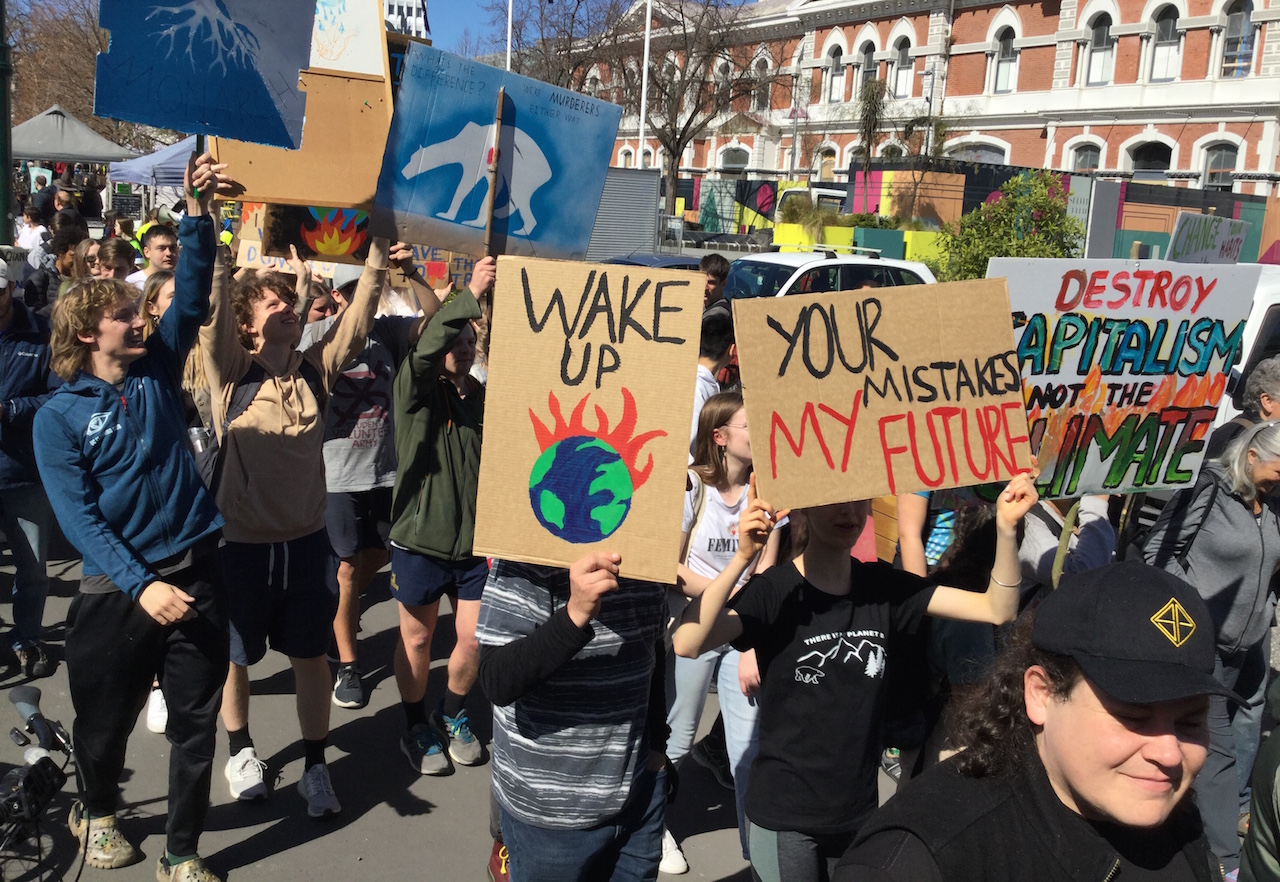Christchurch is known as one of Aotearoa/New Zealand’s more conservative and least diverse cities, and it’s been through a lot in the past decade — devastating earthquakes in 2010-11, killing hundreds and leaving many thousands homeless and traumatized (in many cases, still) and earlier this year, the mosque massacre.
So notwithstanding the city’s resilience and long-term recovery from these tragedies, I wasn’t sure what to expect for today’s school strike for the climate. I joined about 300 students and a handful of staff members on the University of Canterbury campus this morning, to walk towards the downtown square next to the devastated cathedral (which after much debate, is to be rebuilt). Three hundred students I thought — not bad — relative to enrollment, that’s like 600 at Simon Fraser University. We walked en masse through suburban back roads and the peaceful Hagley Park, rivalling Stanley Park in size if not wilderness. Energetic young people set a surprisingly vigorous pace for such a large group, and we supportive seniors brought up the rear. When we arrived at the square, the throng was already gathered, and its size was a welcome surprise — about 6,000. One group of students from suburban Lincoln University had started walking at 6 a.m. to cover the 22 kilometres on foot.
I made a note of the placards, to see what kinds of claims are being made, what structure of feeling is being mobilized. Some clever ones — “For the Greta good.” Anger and frustration, but also joy at such a coming together. Not a lot of specific policy demands (a few references to divestment or ending oil exploration), and I could not see one sign out of hundreds that referred to a carbon tax. But rather generic environmentalism — “save the planet,” and demands for drastic action — of some kind — now. “This is survival, not politics” said one sign. But perhaps it’s a demand for a new kind of politics, which these young people are helping to invent. Supported by their elders, such as the man whose placard displayed his grandchildren. As one woman said, the youth are no longer the future leaders; they are the leaders.
Interestingly, one of the most vocalized chants was for “climate justice” — not a slogan I’ve heard much at anti-pipeline rallies in B.C. I wonder if it’s a concept that resonates more down here, perhaps because of the proximity of the disappearing Pacific Island nations and their climate refugees?
Some elements in the crowd did call out specific institutions as a source of emissions — not fossil fuel extraction as in Canada, but meat-producing animal farming. And the solution offered combines personal and political — “Go vegan.” Judging from the T-shirts and pre-printed signs, veganism is a definite movement here.
A trio of aging males stared balefully at the crowd, clustered around a sign claiming “man-made climate change is a hoax.” They were cheerfully ignored. Outnumbered 2,000 to one and doubtless swept away by a tide of reality, they soon left.
Local TV news covered the event sympathetically, as a kind of carnival, emphasizing generic “let’s do it, we’re all in it together” emotions rather than more politically charged claims.
Across New Zealand, in various towns and cities, a reported 170,000 people took part. That’s about 3.4 per cent of the population — one of the largest protests in the country’s history, and the equivalent of a million people on Canadian streets.
Sustained political opposition from just a heavily engaged three per cent of the population was sufficient to overthrow authoritarian governments in eastern Europe during the 1980s and 1990s. That was a rather different political and historical context. But three per cent is a worthy benchmark to aim for in the era of planetary emergency — especially if it’s the generation that must bear the brunt of its consequences.
Robert Hackett is professor emeritus of communication at Simon Fraser University. He has published eight (mostly collaborative) academic books on media and politics, most recently Journalism and Climate Crisis in 2017.
Image: Angelika Hackett
Editor’s note, October 1, 2019: This blog was edited to correct the name give in the image credit.



